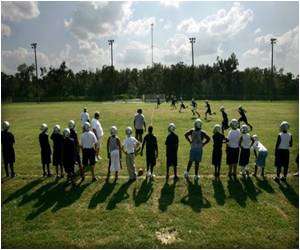For athletes who have experienced a concussion, the difference in performance between genders should be of great interest to athletes, coaches, trainers.

"The difference in performance between genders should be of great interest to athletes, coaches, athletic trainers, and doctors who utilize baseline assessments to aid recovery protocols," said study author Kathryn L. O'Connor from the University of Michigan in Ann Arbor.
The study will be presented at the Sports Concussion Conference in Denver. Of the participants, 45 percent were female, 51 percent played a contact sport and 24 percent had experienced a concussion. They had an average of 0.3 concussions, ranging from zero to four.
Women who have had a history of at least one concussion do not score lower on computerized cognitive baseline testing. Women reported on average 1.5 more symptoms and scored three points higher on symptom severity than men. On a clinical reaction time task, women were 19 milliseconds slower to react than men.
"This result that cognitive skills were not significantly affected by having a concussion for either gender should be reassuring to athletes who have experienced a concussion and wonder about its later effects," O'Connor said.
Source-IANS










